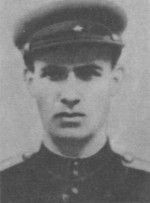Arkadii Pantielev was born in 1919 in Pochep, western Russia. His original name was Avrohem-Nokhem, and he was one of eight children in a religious Jewish family. His father, Khatskel (Yehezkel) Pantielev, worked as a forester. In 1929, the family left their town for a suburb of Moscow, where the father worked at a machine-building plant. All of his attempts to give his sons a religious education were in vain, since they did not want to study Judaism. The tall and robust Avrohem, who showed good organizational skills, began a career in the Komsomol (Young Communist League) – first at his school, and later at his alma mater, the Moscow Potiomkin Pedagogical Institute (University), where he was appointed first secretary of the Komsomol organization. In 1939, he graduated from the Institute and began an administrative career, becoming a functionary at the School Department of the Moscow Party Committee. Arkadii's brother Iakov recalls in his memoirs that Arkadii was the only one of Khatskel's apikorsim (apostate) sons with whom the pious father had no quarrel.1
In June 1941, the Soviet-German war broke out, and Arkadii was tasked with the evacuation of industry from Moscow and the region. In all likelihood, Arkadii was not satisfied with administrative tasks, since he volunteered for frontline service in August 1942. In October that year, he was sent to a military political school, and in 1943 he was serving as a political functionary at the front. Arkadii Pantielev was the agitator of the 634th Rifle Regiment (the 119th Rifle Division), first at the Western, and later at the 1st Baltic Front. Despite his position as a political worker, Arkadii fought in numerous battles side by side with other soldiers – e.g., during the liberation of Velikie Luki (western Russia) in December 1942-January 1943.
In July 1944, during the Red Army offensive in northern Belorussia, Senior Lieutenant Arkadii Pantielev, who was commanding a riflemen platoon, was killed in the battle for Drissa (present-day Severodvinsk). Pantielev was awarded two military orders – the Order of the Red Star and the Order of the Patriotic War, 2nd class (posthumously) – in addition to the medal "For Courage". He was buried in the Drissa central square together with his comrades. The monument on his grave was erected on the initiative of his brother, Iakov Pantielev.
Two of his brothers, Iakov (Gesil) and Natan, also took part in frontline combat during the Soviet-German War and became permanently disabled. Two his stepbrothers, the orphans Boris and Lev, who had been adopted and brought up by Khatskel Pantielev (a distant relative of theirs), also fought in the war, and were declared "missing in action" in late 1942.
- 1. Iakov Pantielev, Kto ia?, Moscow: IRITs "Fermer", 1997, p. 77







